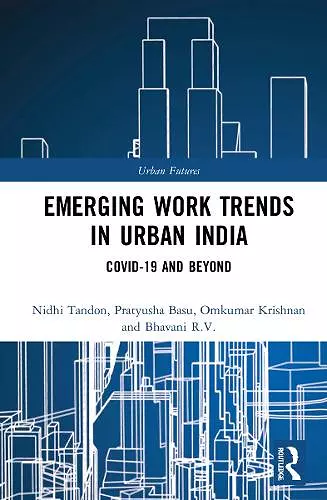Emerging Work Trends in Urban India
COVID-19 and Beyond
Pratyusha Basu author Nidhi Tandon author Omkumar Krishnan author Bhavani RV author
Format:Hardback
Publisher:Taylor & Francis Ltd
Published:11th Mar '22
Currently unavailable, and unfortunately no date known when it will be back
This hardback is available in another edition too:
- Paperback£41.99(9781032205687)

This book offers an overview of India’s emerging digital economy and the resulting challenges and opportunities for urban workplaces. It examines contemporary economic and social transformations in India by focusing on how new technologies and policies are shaping urban work practices and patterns. The book emphasizes inclusive and equitable practices that consider the needs of the formal and informal sector workforce as essential to India’s urban development. Drawing on cross-disciplinary frameworks, it examines key issues related to work trends in the Indian urban economy and its digital landscapes, including Industry 4.0 and technology–labour nexus, smart cities and innovation, urbanism and consumerism, workplace transitions such as service industry and remote work, digital divide, skill development initiatives, and the impact of socio-economic inequalities and disruptions. The authors provide perspectives on the digital future of urban work in India and other emerging economies in the post-COVID-19 phase, and underscore the importance of enacting balanced policies, remodelling institutions, and equipping the labour force for adapting to new demands related to future employability and investments.
This book will interest students, teachers, and researchers of urban studies, urban sociology, sociology of work, labour studies, human and urban geography, economic geography, urban economics, development studies, urban development and planning, public policy, regional planning, politics of urban development, social and cultural change, urban sustainability, environmental studies, management studies, South Asian Studies, and Global South studies. It will also be useful to policymakers, non-governmental organizations, activists, and those interested in India and the future of the global economy.
“Emerging Work Trends in India: COVID-19 and Beyond is a brilliantly written book capturing the changing dynamics of the workspace in India. It critically and objectively describes the challenges during and after this public health crisis and how it is going to change the landscape in time to come in one of the world's most culturally diverse and vibrant countries. It is a very insightful groundwork that explains the complex interplay of the social, political, and economic factors and their impact on society at large in the given situation.”
Ranjeet S Ajmani, Chief Executive Officer, PlasmaGen BioSciences, Bangalore, India
“A much-needed recipe to learn the changing trends of work towards automation. It spans the entire gamut of manufacturing to services and the need for digitalisation while addressing the socio-political and cultural barriers.”
Bhavik Kumar, Founder & CEO, Medibox, India
“The Covid-19 pandemic has intersected with ongoing digital technology led economic transformations to bring about serious disruptions to work, livelihoods, incomes, and inequalities across rural and urban India. This book offers a comprehensive and inter-disciplinary overview of the precarity, fissures, and exclusions brought about by these ongoing changes. Focusing on the formal and informal sectors, on issues related to skills, gender nature of impacts, and rural-urban divides, and the "the digitalisation of the urban", the volume thoroughly analyses impacts of technology on work and work force to yield significant policy recommendations that address the future of work, and the way forward for reducing inequalities.”
D. Parthasarathy, Professor, Department of Humanities and Social Sciences, Indian Institute of Technology Bombay, Mumbai, India
"The seven essays in this anthology are cohesive, well-written, and well-researched, and they share two common themes. First, they examine elements of the Fourth Industrial Revolution—artificial intelligence, machine learning, automation and robotics, the internet of things, and other digital technologies—and their requirements of energy, communication, water, transportation, health care, property rights, other infrastructure, and, most important, an appropriately skilled labor force. Second, they emphasize the critical need to account for current and likely future inequalities of income, age, geographic location, gender, caste, literacy, language proficiency, and opportunities to participate in evolving sociopolitical and economic environments. Individual chapters focus on workplaces, services, technology, informal sectors, digital technologies, and smart cities and consider the likely changes in how, where, and what Indian workers will produce in the future. The initial chapters provide a global context for specific experiences and the structure of the Indian economy; others describe a large number of central government policies and legislation. All urge a range of policy considerations and recommendations. These perceptive essays will be of great interest to a wide swath of social scientists."
M. J. Frost, emerita, Wittenberg University
ISBN: 9781032027548
Dimensions: unknown
Weight: 453g
208 pages